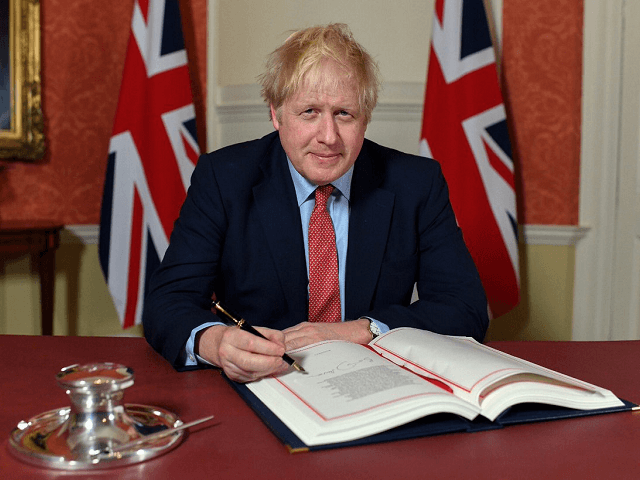The President of the European Commission, the head of the European Council, and UK Prime Minister Boris Johnson have signed the agreement governing the United Kingdom’s withdrawal of the European Union, one of the final steps towards Brexit at the end of January.
New Commission president Ursula von der Leyen shared photographs of herself and European Council president Charles Michel signing the document — in blue ballpoint pens, an informal touch defying the normal global convention of signing treaties with real ink pens — Friday morning, overlooked in their task by a stern Michel Barnier, the EU’s chief Brexit negotiator.
The leather-bound, 600-page document was then rushed to London by diplomatic courier where it was signed British Prime Minister Boris Johnson at Downing Street, his official residence. The Prime Minister was photographed signing the document with a fountain pen. Noting the importance of the occasion, Mr Johnson said: “This signature heralds a new chapter in our nation’s history.”
Now the withdrawal agreement has been signed off by Britain’s Parliament, having passed both houses and been made law by Queen Elizabeth II on Thursday, by top Eurocrats von der Leyen and Michel, and by Prime Minister Johnson, the final step is for the document to be ratified by the European Parliament. While there are just seven days to go until the official Brexit date of January 31st, this is not expected to be voted on by MEPs until the last moment, as late as Thursday or Friday next week.
Charles Michel wrote of the occasion that while there would be change between the UK and the EU, the two would remain friends and he was looking forward to writing a new page in history.
As British newspaper The Guardian notes, the bumper document signed by the Eurocrats stands at an astonishing 600 pages of type, and governs the coming months and years between the United Kingdom and the European Union.
While Britain is technically leaving the EU on January 31st, in reality, it is then entering a half in, half out limbo period where many European laws and regulations still apply to the nation, even though it is not a member and as such no longer has representation in European institutions. The UK will remain in this state of limbo — it hopes — for 11 months until the end of 2020, when a trade deal would be signed and the country would move forward on a new footing.
But that itself is fraught with uncertainty — many in Brussels have warned signing a new trade deal, for a bloc where deals take years or decades to conclude, would be impossible. In the case of it not being signed, it is not clear whether the UK would simply walk away and trade on World Trade Organization rules as all nations that don’t have their own treaties do, or if it would carry on in the limbo state.
Brexiteers worry the second option leaves the nation open to the prospect of being trapped in the European Union indefinitely. A similar danger exists with a badly executed trade deal, however, which could leave too many powers in the hands of Brussels in return for trade rights. This again could leave the UK in a half-in-0half-out limbo indefinitely, failing in doing so to execute a meaningful Brexit.

COMMENTS
Please let us know if you're having issues with commenting.